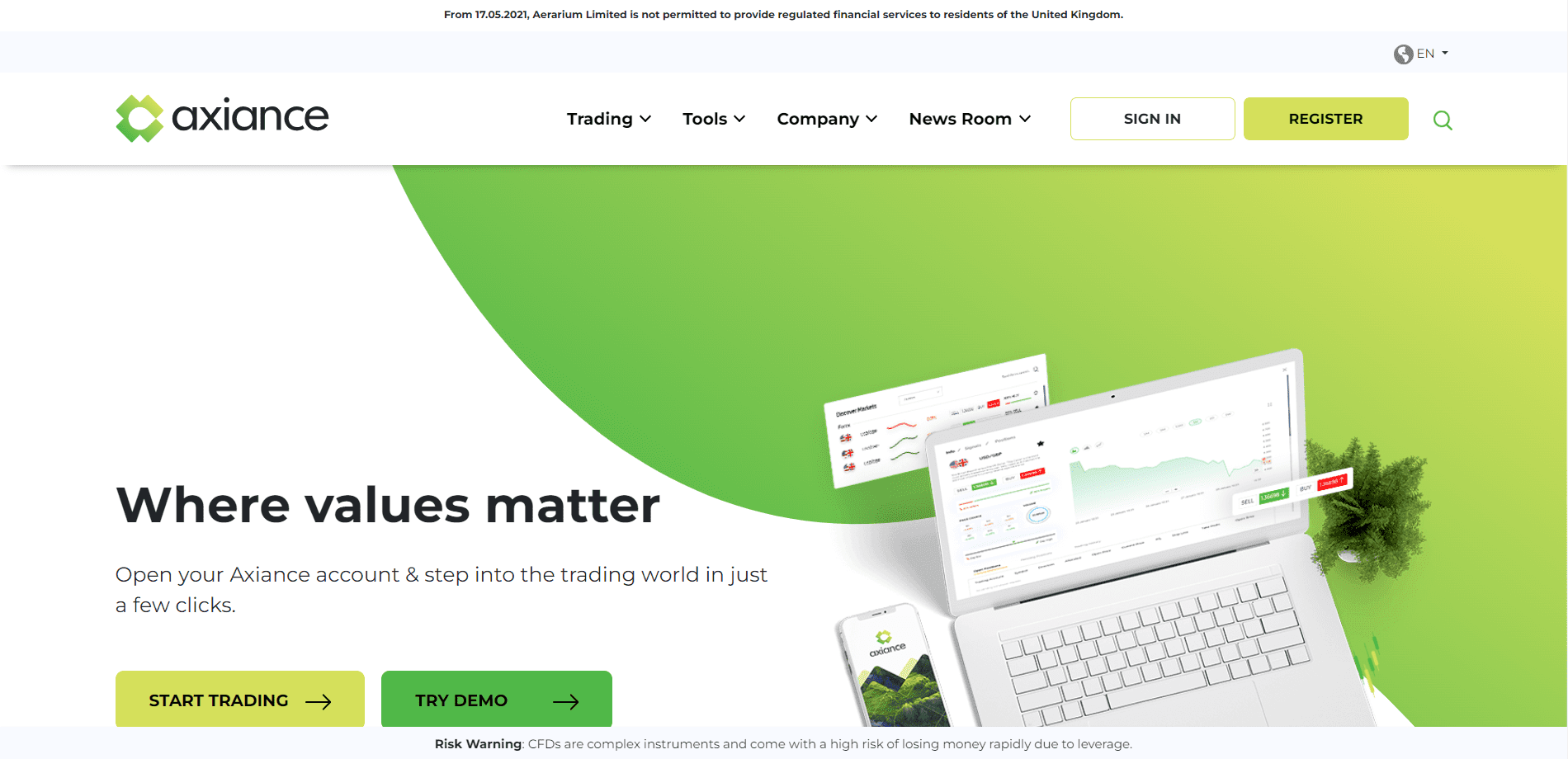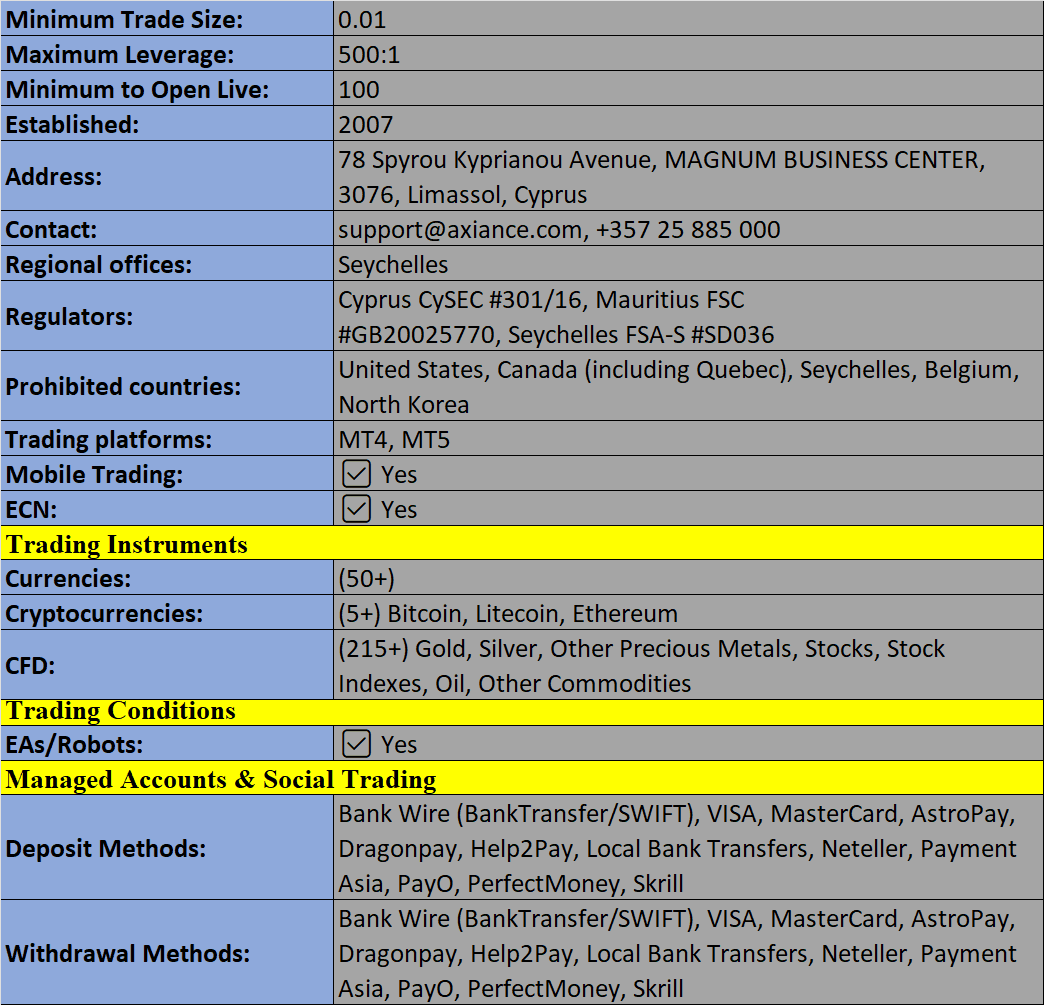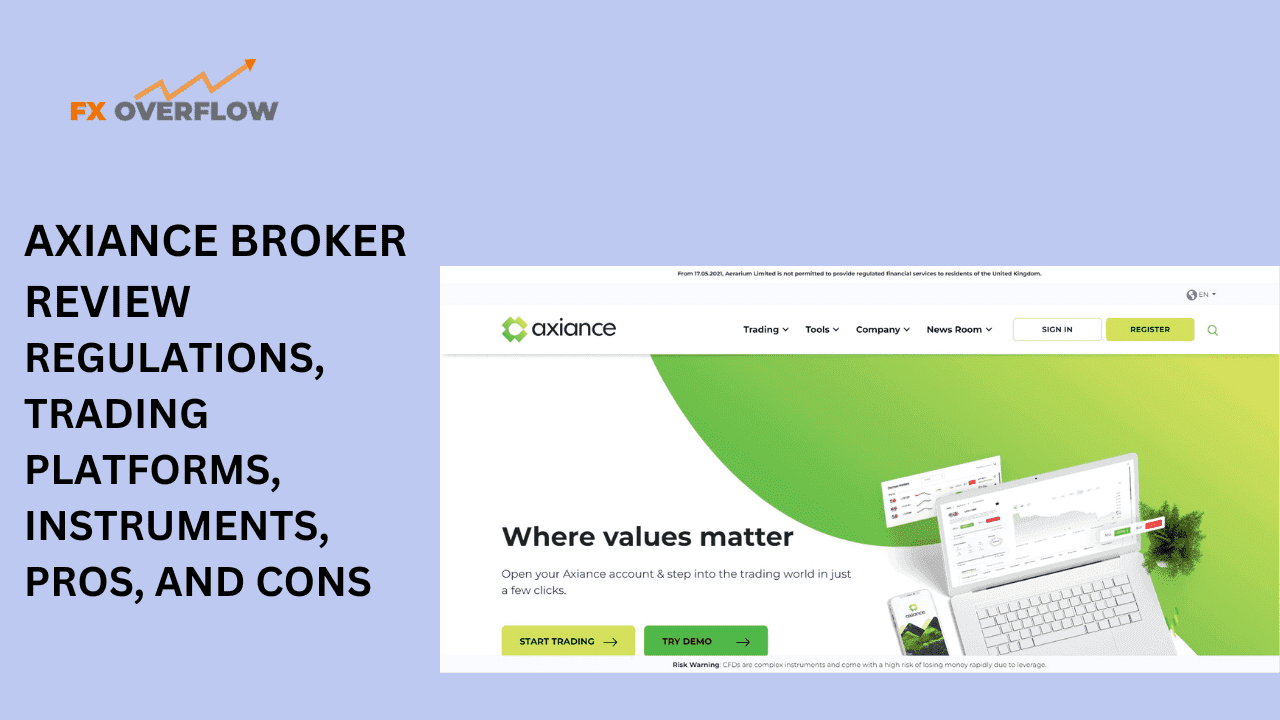Axiance Broker Review - Regulations, Trading Platforms, Instruments, Pros, and Cons
Axiance stands as an international online brokerage firm built on the pillars of diversity, flexibility, transparency, and equitable pricing structures. In today's global market, finding a trustworthy and comprehensive Axiance review, whether local or worldwide, can be a challenging task. It is crucial to rely on credible sources for an accurate evaluation before making decisions regarding account opening or trading on their platform.
Forex brokers play a pivotal role in providing traders access to a platform for buying and selling foreign currencies. In the forex market, transactions revolve around pairs of different currencies, with traders either buying or selling the specific currency pairs they choose. These brokers are often referred to as retail forex brokers or currency trading brokers.

It's essential to note that most forex brokerages handle only a fraction of the overall foreign exchange market volume. Retail currency traders typically use these brokers to access the 24-hour currency market for speculative purposes, while larger institutions turn to firms such as investment banks for their forex broker needs.
Founded in 2016 by ICC Intercertus Capital Limited, Axiance is a relatively new player in the brokerage scene. The company is headquartered in Limassol, Cyprus, with global headquarters in the Grand Cayman Islands. Axiance has faced scrutiny in recent years due to its offshore status, prompting the company to restructure its regulatory framework and align itself with European regulators.
Despite its relatively short history, Axiance has successfully expanded its global operations, focusing on establishing long-term and trustworthy relationships with its clients. The company's commitment extends to creating a conducive trading environment by providing traders with the necessary tools, knowledge, and support to thrive and excel in their trading strategies.
Axiance Account Types
In the world of forex trading, selecting the right account type is a critical decision that can significantly impact your profitability. The forex market caters to a diverse range of traders, including beginners, intermediates, seasoned professionals, and institutional players. Consequently, there are various types of accounts available to cater to different needs.
When choosing an account type, consider factors like transaction costs, spreads, commissions, trading routing, trading software, platforms, and the range of available markets. These elements collectively determine the suitability of an account for your trading style and goals.
Axiance Deposit and Withdrawal
The initial deposit requirement at Axiance depends on the chosen account tier, each offering distinct benefits. Traders can upgrade to a higher-tier account by increasing their deposit size. Depositing funds with Axiance is straightforward and efficient, with various methods available, and the company does not impose deposit fees. Payment options include credit cards (Visa, Mastercard), e-wallets (Trio, Pay Trust, FasaPay, Perfect Money), and bank transfers, with multiple currencies supported.
Axiance Fees and Spreads
Trading in the forex market incurs costs that traders must consider as part of their trading expenses. These costs vary among brokers but generally include spreads and commission fees. The spread represents the difference between the bid and ask prices of a currency pair, serving as the primary source of revenue for brokers. Commissions are fees charged by the broker for each trade placed.
Axiance's benchmark EUR/USD spread typically hovers around 2 pips, which is slightly higher than many other brokers. Additionally, the company reserves the right to levy maintenance fees, although the exact amounts are unspecified. Different account types come with varying commission structures, and traders should be aware of potential hidden fees like inactivity fees, monthly or quarterly minimums, and margin costs.
Axiance Leverage
Leverage plays a pivotal role in forex trading, allowing traders to borrow capital from their broker to amplify potential returns. The extent of leverage offered varies between brokers and is influenced by trading conditions and regional regulations.
Operating both in the Cayman Islands and Cyprus, Axiance provides different leverage levels based on regional jurisdiction. The European Economic Area (EEA) regulations cap leverage at 1:30, reflecting a conservative approach due to the inherent risk. However, for traders working with Axiance outside CySEC regulation, leverage as high as 1:500 is on the table. It's important to note that high leverage carries higher risks, especially for those dealing with the unregulated division of the broker.
Axiance Trading Platforms
Selecting the right trading platform is crucial for forex traders. The platform serves as the software interface through which traders execute their trades. Axiance offers three advanced and widely used trading platforms: MetaTrader4, MetaTrader5, and the WebTrader platform.
- MetaTrader4 (MT4): Renowned for its streamlined execution and diverse charting tools across multiple asset classes, MT4 is popular among traders of all experience levels.
- MetaTrader5 (MT5): Building on MT4's foundation, MT5 offers enhanced features, including support for more assets, execution options, order types, indicators, and graphical tools.
- WebTrader Status: Axiance's proprietary Status platform emphasizes user-friendliness, providing accessible tools and symbols accessible from any device.
Axiance Market Instruments
Axiance offers a wide range of market instruments for trading, including:
- Forex: Trading in global currencies in a dynamic exchange market.
- Commodities: Investment opportunities in tradable goods, particularly valuable during periods of inflation or economic uncertainty.
- Indices: Measurement of specific stock market segments, representing a nation's largest companies or specific stock markets.
- Precious Metals: Trading in gold and other precious metals through contract-based tradable assets.
- Energy: High volatility energy trading influenced by political, environmental, supply-demand factors, and global economic growth.
Axiance Customer Support
Effective customer support is vital when choosing a broker, as it ensures prompt resolution of issues and efficient navigation of trading platforms. Axiance offers basic customer support through an online query submission form but lacks direct phone support or live chat options.
Advantages of Trading with Axiance:
- Standard accounts available with deposits starting at $100.
- High leverage, with ratios of up to 1:500.
- Free virtual private server (VPS) service.
- Diverse selection of CFDs and currency pairs.
- Accounts tailored for professional traders with spreads starting from 0 pips.
- Multiple payment systems for deposits and withdrawals.
- Negative balance protection for retail clients.
Disadvantages of Axiance:
- Limited trading education resources.
- Absence of cent accounts.
- Higher average spreads compared to popular forex brokers.
Axiance presents itself as a diverse and flexible international online broker with a commitment to transparency and equitable pricing. While offering various advantages, such as high leverage and a wide range of market instruments, it's essential for traders to carefully consider the specific account type, fees, and leverage options that align with their trading strategy and risk tolerance. Additionally, Axiance's customer support options may be limited, and traders should weigh these factors when making their decision.
Axiance Broker Details

Disclaimer: - We at forexoverflow do not endorse neither refer anyone to trading broker websites. The information is for educational purpose and source of information is from the broker website.











Discussion